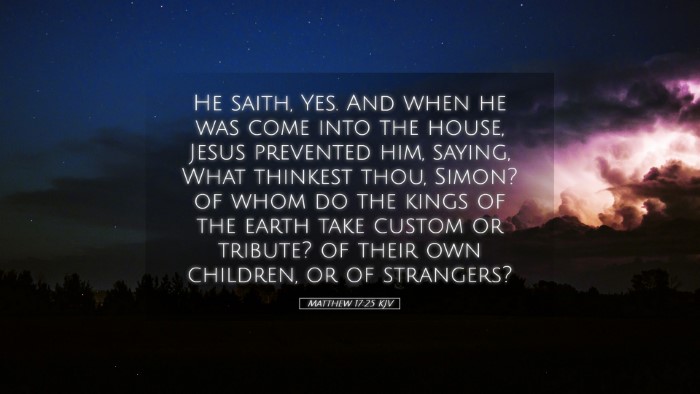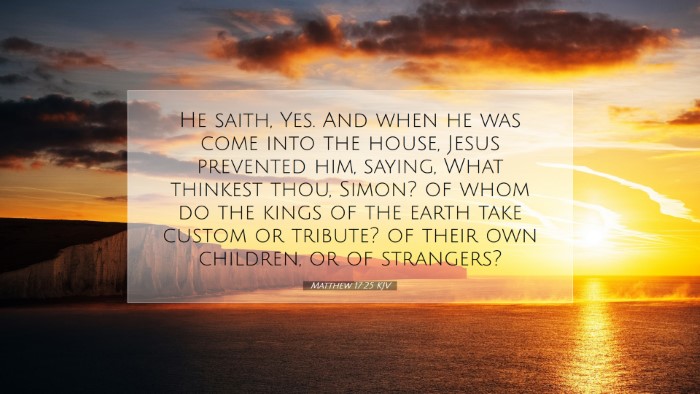Matthew 17:25 Commentary
Verse: Matthew 17:25 - “He said, Yes. And when he was come into the house, Jesus prevented him, saying, What thinkest thou, Simon? of whom do the kings of the earth take custom or tribute? of their own children, or of strangers?”
Overview
This verse is a part of the narrative that illustrates Jesus’ authority and the unique relationship he has with God the Father, alongside teaching His disciples about the implications of His divine sonship. The exchange highlights the principle of freedom versus obligation, especially in the context of taxation and social expectations.
Exegetical Insights
In Matthew 17:24-27, we see that the temple tax collectors approached Peter, inquiring whether Jesus paid the temple tax. Matthew Henry comments that this question serves to illustrate how Jesus, though He is the Son of God and thus technically exempt from such duties, honors the legal customs of His time for the sake of avoiding offense.
Responses to Taxation
Albert Barnes notes that Peter's response is immediate and affirmative: "Yes." However, when Jesus later addresses Peter, He preempts any notion that Peter might harbor concerning the propriety of taxing the Son of God. Jesus questions Peter about the practices of earthly kings.
Jesus' Question to Peter
The query, “What thinkest thou, Simon? Of whom do the kings of the earth take custom or tribute?” invites deep reflection on social hierarchies and obligations. Adam Clarke comments that the kings typically collect taxes from outsiders rather than from their own families, suggesting that sons are exempt from taxation.
The Implication of Sonship
Here, Jesus draws a parallel to His own identity as God’s Son. If earthly kings do not tax their own children, neither should the Son of God be subject to temple tax. Yet, Jesus’ keen understanding of authority and His willingness to submit to the expectations of human society highlight His humility and purpose.
Theological Significance
This incident reveals Jesus’ divine nature while illustrating His mission. By paying the tax, He demonstrates obedience to civil authority, recognizing the harmony that should exist between the kingdom of God and the kingdoms of this world. As is noted in the works of Clarke, this moment reminds believers of the importance of honoring societal obligations while maintaining a clear understanding of our identity in Christ.
Application for Believers
Pastors and scholars might derive several important applications from this text:
- Understanding Authority: Just as Jesus navigated earthly customs with grace, believers are called to engage with society respectfully while upholding their identity in Christ.
- Freedom Versus Responsibility: Our freedom as children of God does not exempt us from our responsibilities to society. Jesus’ actions model this balance effectively.
- Humility and Submission: Through His willingness to pay the temple tax, Jesus teaches us the value of humility and the importance of sometimes setting aside our rights for the sake of others.
Conclusion
Matthew 17:25 serves as a profound reminder of the dual nature of the Christian experience; we are both citizens of heaven and participants in earthly systems. This passage, explored through the lens of historical and theological commentary, encourages every believer to reflect on their identity as children of God while living out their faith within the framework of societal norms.


